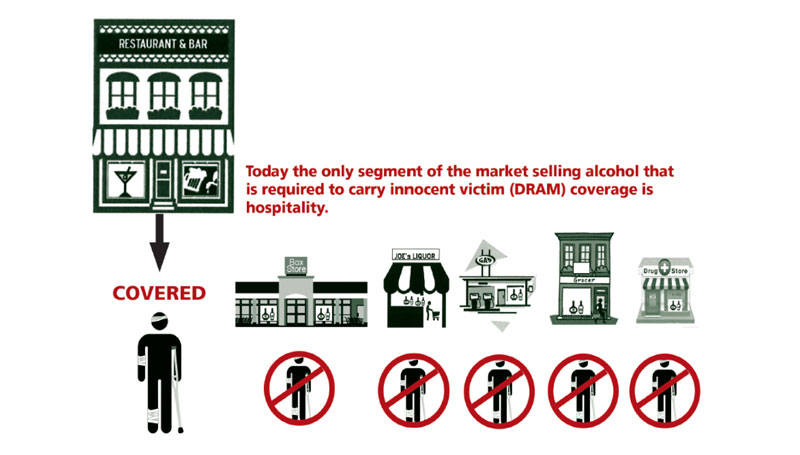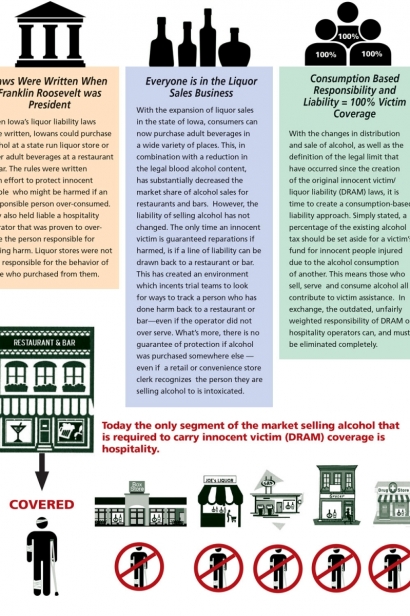Dram Shop: Time to Reform this Arcane Law
Among the more outdated and out-of-whack laws involving the sale and consumption of alcoholic beverages is one called “dram shop.” The name comes from a small unit of measure – a dram is a little under a modern teaspoon – and some pre-prohibition bars were called “dram shops.” Very few people who are not bar owners or litigators have even heard the term, let alone understood its modern meaning or purpose. In essence, it is a legal tool with which an injured third party, such as the victim of a car accident caused by a drunken person, can recover damages from the establishment who is proven to have over-served said drunken person.
On its face, that seems perfectly reasonable (arguments by some about personal responsibility aside). Here in Iowa, the dram shop law has been around since repeal, a little more than 80 years. Any bar, or restaurant that serves alcohol, is required to carry what’s called dram shop insurance, just in case the unthinkable may occur. The insurance is very hard to get (very few companies carry it anymore), it costs the establishment anywhere from about a thousand dollars to many tens of thousands, depending on their size, and is one of several reasons why a bottle of wine costs more in a restaurant than it does at a retail store.
So far, so good. If something tragic happens, a bar owner like me can be held accountable, and the insurance I buy can compensate the victim, theoretically without putting me out of business entirely. Over those eight decades, however, many changes have come to the way alcohol is obtained and consumed in Iowa. When the laws were written, you could get a drink at a bar or restaurant, or you could buy packaged wine, beer or liquor from a state store. These were the only options if you chose to imbibe in Iowa. Today, alcohol is available in a wide array of retail outlets, and not just private liquor stores. Today gas stations, grocers, drug stores, convenience stores, big box stores all can sell alcohol, and none of them are required to carry dram shop protection.
What this can mean in the real world is if you have a glass of wine at my bar, and then you go to a convenience store, get a bottle of Jack and park your car in the neighbor’s living room, your neighbor’s lawyer will come after me, not the store, because I have dram shop insurance, and the Willie Sutton rule applies (“That’s where the money is”). If you hadn’t bought that glass of wine from me, the lawyers might try to get compensation from the convenience store, but they don’t have dram shop insurance, so, very likely there is nothing to get but corporate debt.
Before anyone jumps too far ahead of me, I do not advocate requiring dram shop insurance for retailers. And yes, of course innocent victims of these tragedies should be compensated. But there is a better way: let’s create a victim’s fund, modeled on those that exist in other industries, by diverting a percentage of the already-collected taxes on alcohol sales. To be clear, this is not a tax hike, it is a reallocation of a portion of existing taxes on alcohol. Today you pay 19 cents on every gallon of beer you buy (about 10 cents per six pack), and $1.75 on every gallon of wine (roughly 35 cents per bottle, and 3rd highest in the country). The state of Iowa is still the sole wholesaler of distilled spirits here, and they mark up every bottle 50 percent. The result in 2014 was a little over $302 million collected.
A little under $20 million of that goes to the state Department of Public Health. Another $3.6 goes to the various cities and counties issuing the licenses.
Tapping a portion of that remainder for a victim’s fund means compensation for all victims, not just those who are injured by someone who drank in a bar or restaurant. It means those who sell, serve, and consume alcohol are all contributing to victim assistance. In exchange, the unfairly weighted responsibility of dram shop on hospitality owners can be lifted entirely. Everyone who participates, contributes.
In January I was on the Hill in Des Moines, with several fellow members of the Iowa Restaurant Association, meeting with our legislative leaders in an effort to turn this idea into reality. I hope you will take a moment to call or write your senators and representatives and ask them to be sure ALL innocent victims have access to compensation, and everyone who plays, pays.






